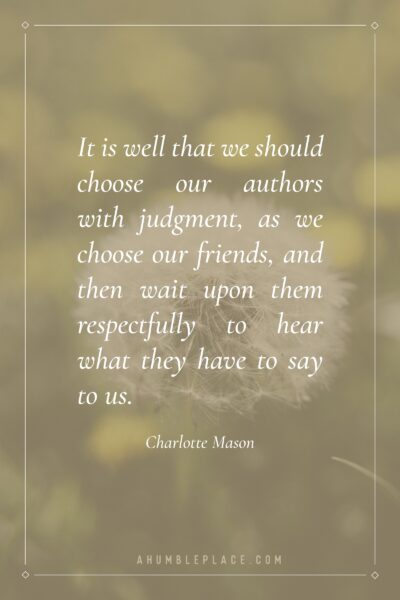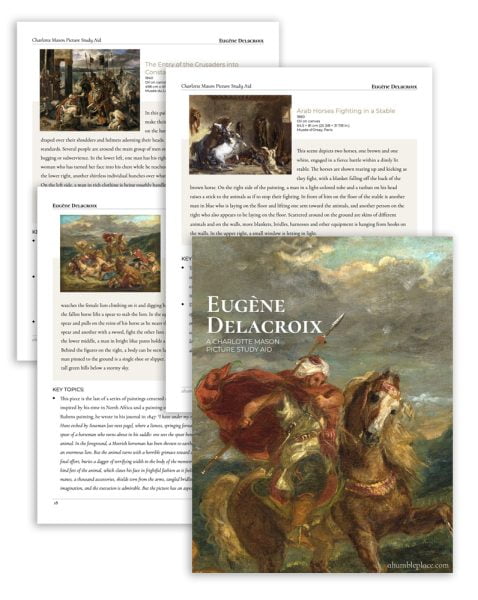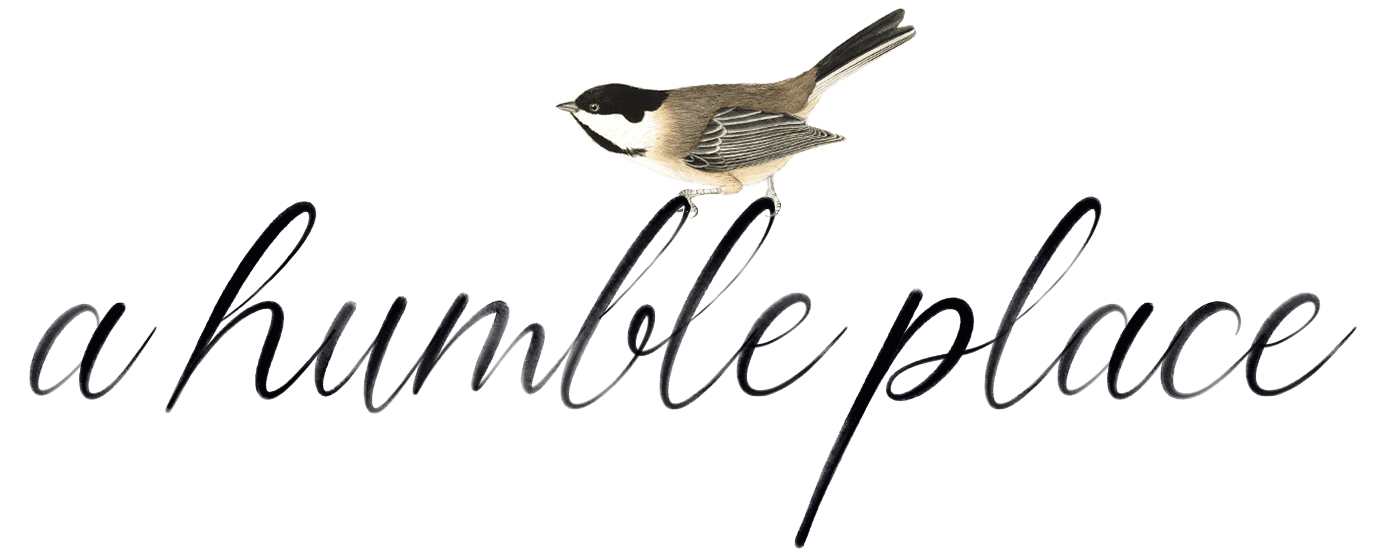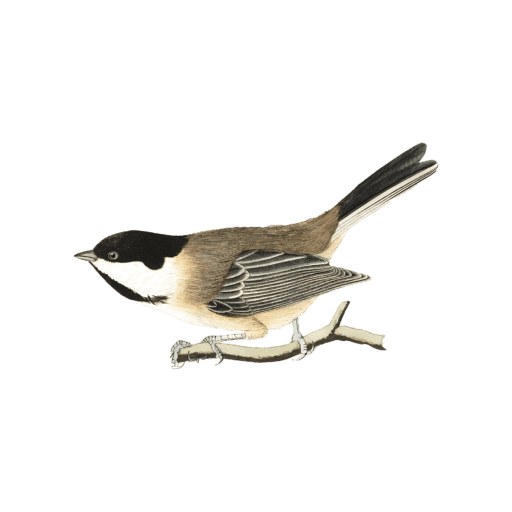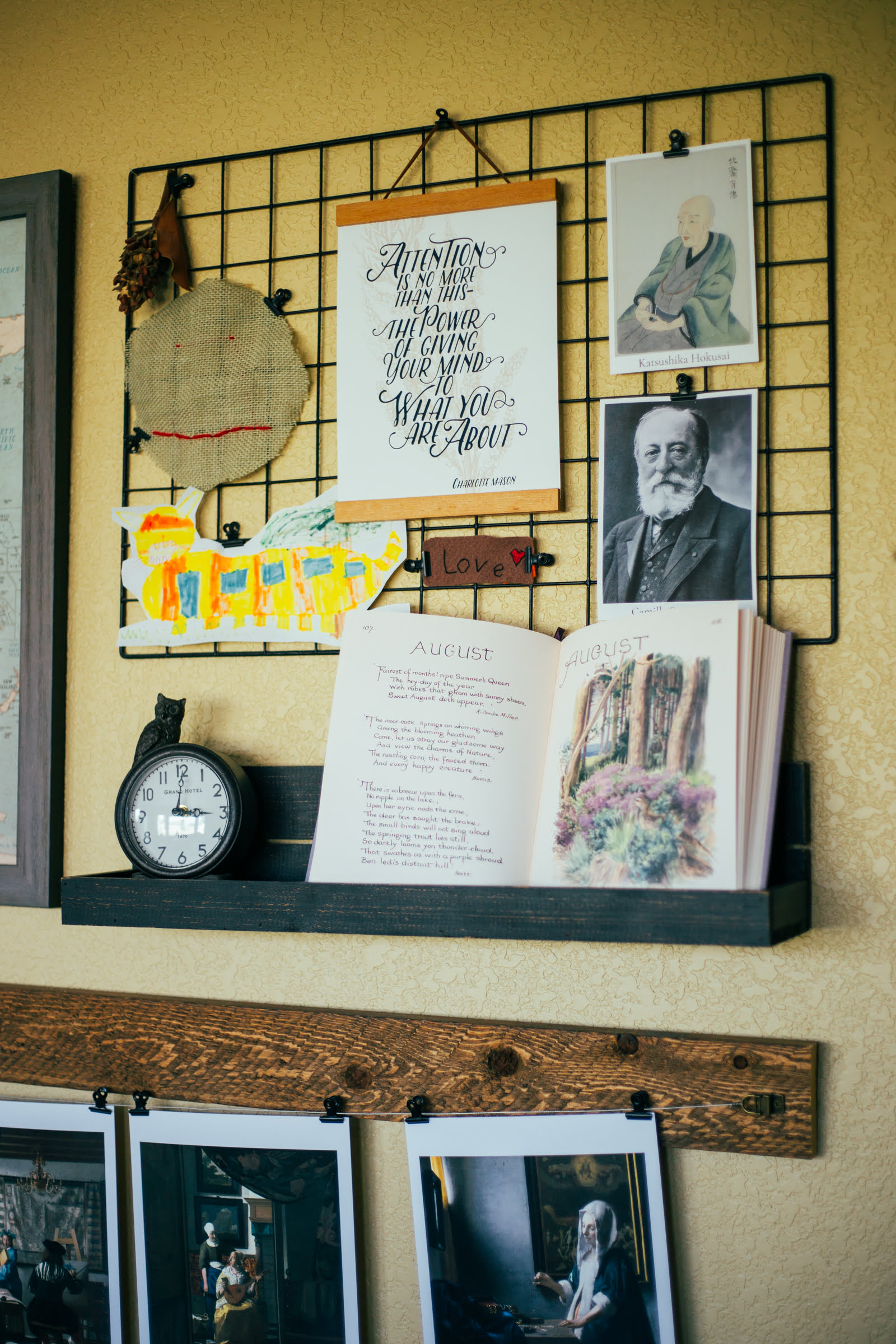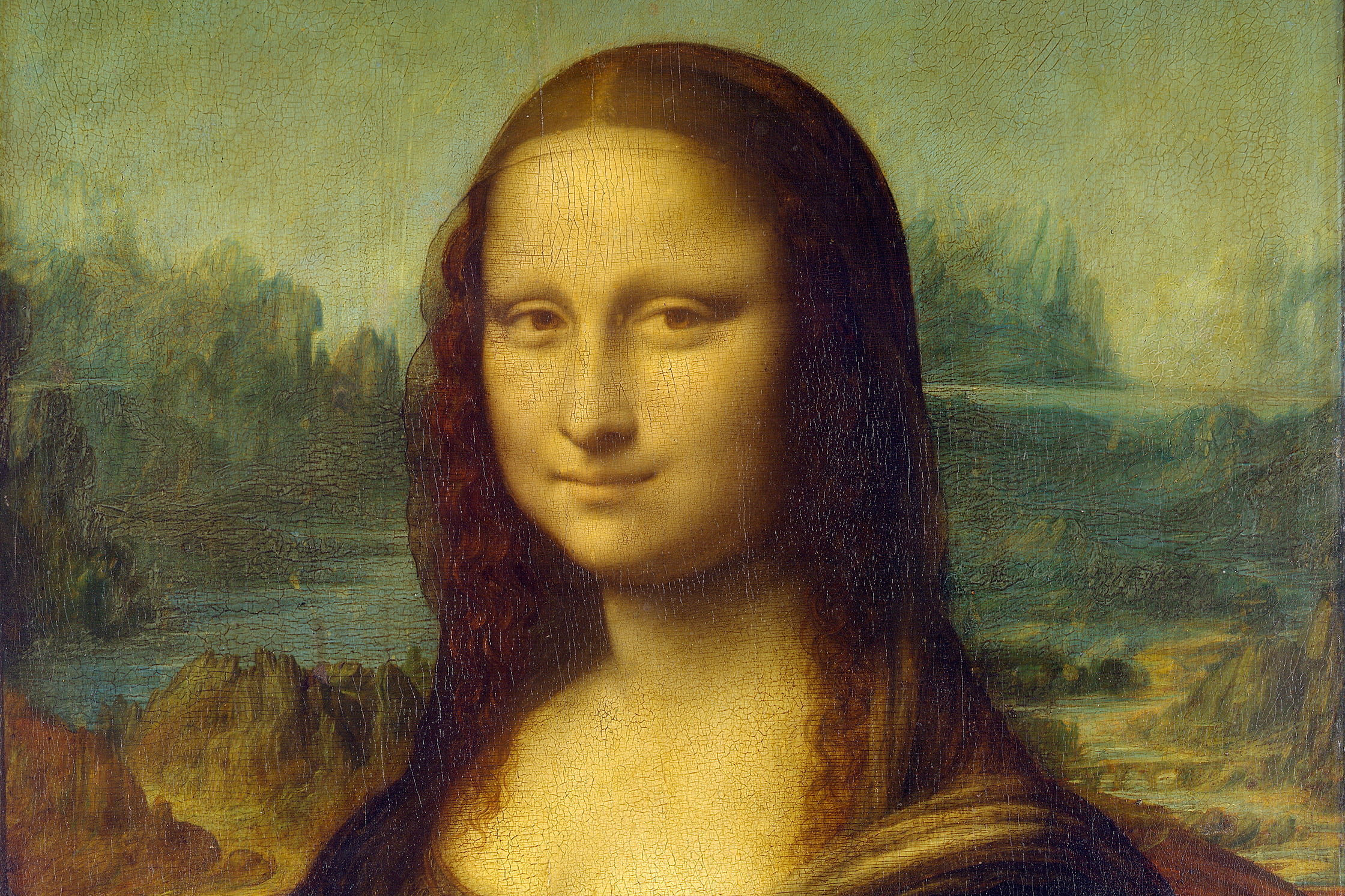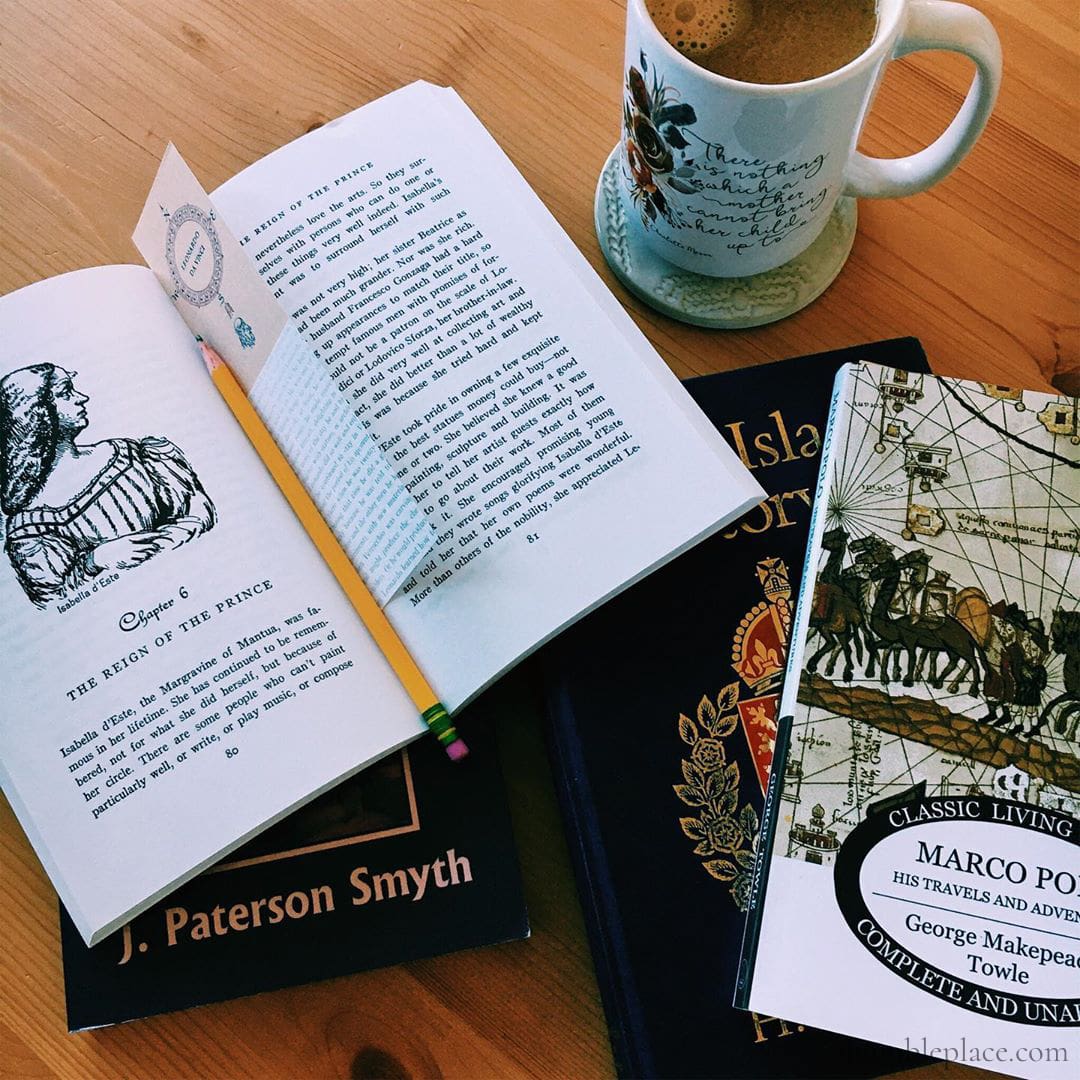Charlotte Mason’s Ourselves Quotes (Part 1)

I explained yesterday that the Charlotte Mason learning co-op that I’m hoping to join when B is in school also has a monthly book study just for the mothers. This month was my first time attending (but hopefully not last!) and we read Volume 4 (Ourselves), Book II, Part I—Conscience, chapters 11-15.
I discovered that it’s infinitely better to be reading through these books with others rather than on my own. Not only are some of the concepts way over my head and the other members of the book study offer some clarity, but it’s also good to bounce aspects of the text off of each other as there were parts that stood out to others that didn’t necessarily stand out to me and vice versa. I think you can get to know how someone’s mind works by hearing what parts of a book that you’ve both read stand out to them.
Here are the parts that caught my attention….
But most of us have little chance of seeing men and things on a wide scale, and our way to an instructed conscience is to read, mark, learn, and inwardly digest. We must read novels, history, poetry, and whatever falls under the head of literature, not for our own ‘culture.’ Some of us begin to dislike the word ‘culture,’ and the idea of a ‘cultivated’ person; any effort which has self as an end is poor and narrow. But there is a better reason for an intimacy with literature as extensive and profound as we can secure. Herein we shall find the reflections of wise men upon the art of living, whether put in the way of record, fable, or precept, and this is the chief art for us all to attain. – Vol 4, pg 70
To put this in perspective, this book was originally published in 1904. At the time, they had newspapers and books and these gave people some view of the larger world, but it was still only what was published and, especially in (barely) post-Victorian England, what was deemed suitable for public consumption (for the most part).
These days, though, we do have a chance of seeing men and things on a wide scale via the internet and television and most other forms of media consumption. Yet, I don’t think it would be wise to use these to create an instructed conscience. In some ways, we can look at a lot of the stuff offered up, especially on the internet right now, as an example of what happens when we actually don’t have an instructed conscience.
What we digest we assimilate, take into ourselves, so that it is part and parcel of us, and no longer separable. – Vol 4 pg 72
This has become so much more evident to me as I’ve gotten older. I don’t know if it’s more of just a HSP thing, but what I read or watch or listen to becoming part of me is most definitely true for me.
It is well that we should choose our authors with judgment, as we choose our friends, and then wait upon them respectfully to hear what they have to say to us. – Vol 4 pg 73
I love this image of authors as friends. 🙂
The Informed Patriot.––We must read our newspaper, of course––newspapers on both sides; but he who founds upon his newspaper is an ignorant patriot and an illiberal citizen. His opinions are no more than parrot-like repetitions of other men’s sayings; – Vol 4 pg 74
I think we have a lot of parrots these days….. I especially like where she says that we should read newspapers of both sides. I think, particularly in the United States where politics can be so polarizing, we have a tendency of only listening to those we agree with or who agree with us. In some ways, listening to the other side can aid us in solidifying our own arguments as well as maybe opening our minds to other ideas as well.
The secret of safety in matters of philosophy, as well as in all practical matters of life, is to know that we are capable of being convinced of anything, however wrong or foolish, unless we are able to bring an instructed conscience to the consideration of the acceptable notion. – Vol 4 pg 78 (emphasis mine)
This is fairly self-explanatory, but I think recent events have also proven this to be very true.
We think, too, that the knowledge of divine things comes by feeling, and chide ourselves because we do not feel more. If we examine the teaching of Christ, we shall find that exceedingly little is said about feeling, and a great deal about knowing: that our Lord’s teaching appeals, not to the heart, but to the intelligence. – Vol 4 pg 80
While I don’t necessarily agree that God’s teaching only appeals to the intelligence, I do think a lot of modern-day Christianity is based on feeling. It’s why we have these crazy A/V experiences at every church service. It’s there to create a feeling….a mood, and it can do so quite effectively, I might add. But there have been times when I’ve been in the worship part of a church service, crazy lights and music blaring, people with their hands lifted up in the air and tears streaming down their faces, and I’m just not feeling it. At all.
Admittedly, it has made me feel less spiritual than they are, but maybe seeking that feeling isn’t really what my pursuit of God should really be about. I like that idea.
“Without a parable spake he not unto them.” Why? That, “hearing they should not hear, and seeing they should not see, neither should they understand.” Here we have a method exactly contrary to all usual methods of teaching. In a general way, the teacher labours to make what he has to say plain to the dullest; and, indeed, we are impatient and fretful under poem or apologue, the meaning of which is not clear at the first glance. That is, we choose that all labour shall be on the part of the teacher, and none upon that of the learner. Whatever we get in this way is soon lost––’lightly come, lightly go’––for knowledge is only to be had at the cost of labour of mind. As regards the knowledge of our religion, above all, we must read, and inwardly digest; for it is only upon that which we take into us as part of ourselves that we grow. Our Lord knew this, and delivered no easy sayings for the instruction of the people. Even his disciples did not understand. Let us put ourselves in their place, and listen to the Master’s ‘hard’ sayings––hard intellectually as well as morally––and see what we should get out of them on the first hearing. The involved arguments of St Paul are infinitely plainer; the dark sayings of the prophets, the Apocalypse itself, are easier to understand, so far as their meaning is decipherable at all, than the simple-sounding sayings of Christ. But this very fact evidences our Lord’s way of teaching us that life comes of knowledge, the knowledge of God. – Vol 4 pg 80-81
I think this is a great quote to emphasize the teaching with living books (rather than textbooks) aspect of her educational principles (I also like that she calls Paul’s writings “plain” 🙂 I struggle with Paul…). Jesus taught in parables rather than delivering hard facts. Why not use his example?
By long, slow study and by quick heart’s love we shall learn to discern God, to know in an instant those words which are not of him; to know that ‘break their teeth in their jaws,’ for instance, is no word of God, but an utterance of the violent human heart, allowed to pass without comment, as are most of the ways and words of men recorded in the Bible. – Vol 4 pg 88
I LOVED this as it’s something I’ve been thinking about quite a lot in recent months. Is Ms. Mason suggesting that not everything in the Bible is truly from God? Hmmm….something to ponder…. 🙂
Let each of us undertake the patient, unflagging, day-by-day observation of the behaviour of sparrow, spider, teazel, of clouds or winds, recording what we ourselves have seen, correcting our records as we learn to be more accurate, and being very chary of conclusions. All we find out may be old knowledge, and is most likely already recorded in books; but, for us, it is new, our own discovery, our personal knowledge, a little bit of the world’s real work which we have attempted and done. Vol 4 pg 101-102
I have observed this with us as we watch the birds every day. Since we started this whole bird-feeding hobby, we have learned a lot about our feathered friends, I’m sure all of which is written down in many books. However, when we observe them on our own and see them doing the things that others have also observed, it’s much more rewarding than just reading it in a book or having someone tell us that yes, goldfinches do change color or, yes, chickadees do fly off with whole peanuts half the size of their bodies. It’s been fun.
More next month!
